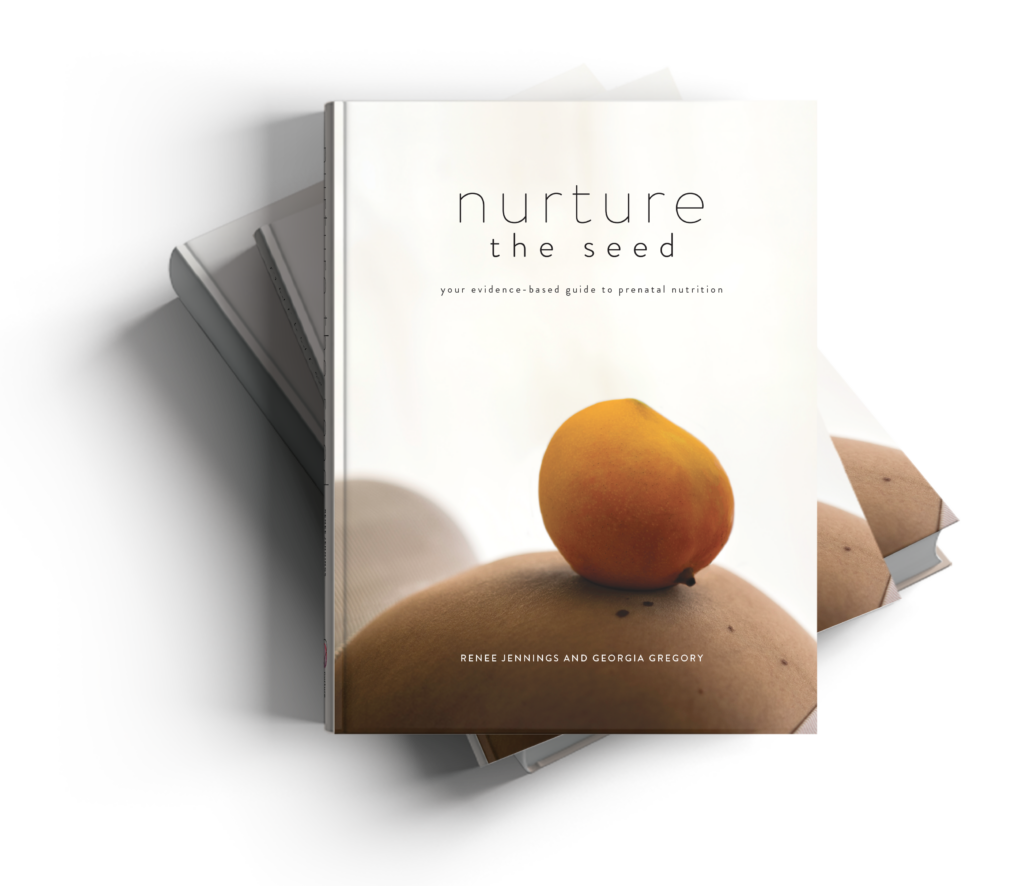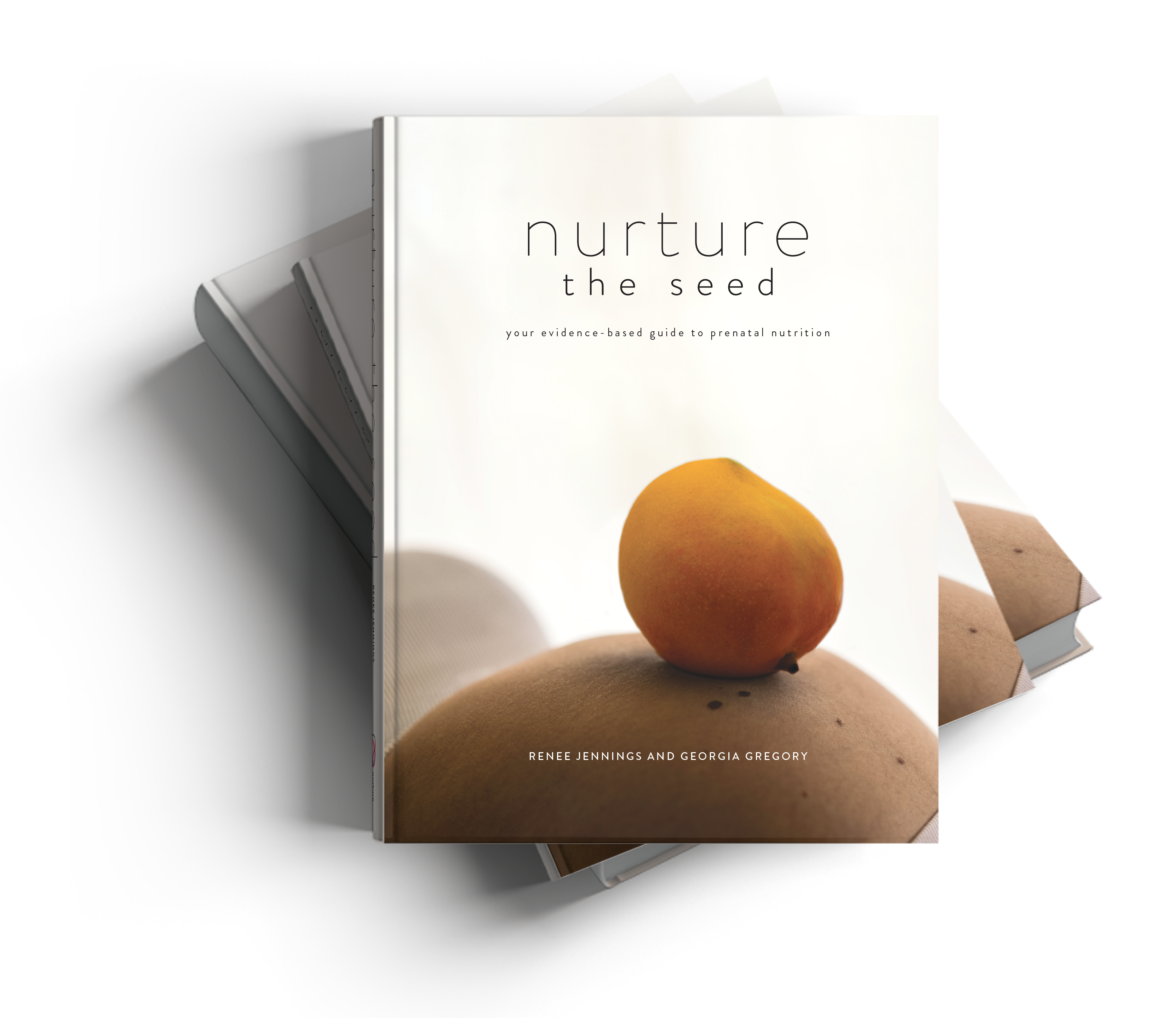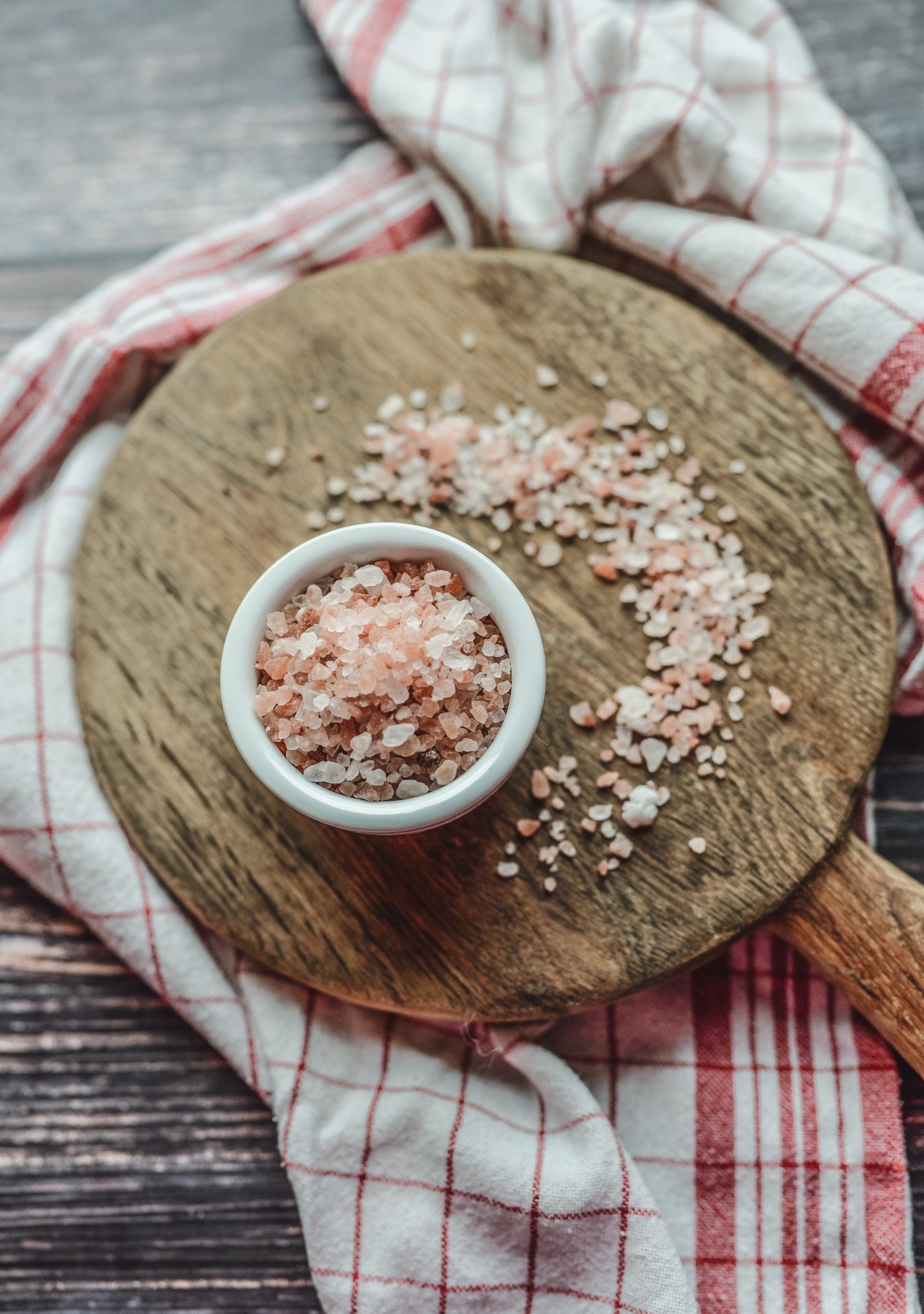Most women know that when trying to conceive; or more commonly thought about once pregnant, is that they should take a prenatal multivitamin. However, how do you choose your prenatal with so many on the market? Is one better than the other?
Before we dive into this topic, it’s important to acknowledge that a prenatal multivitamin does not replace a nutrient-dense diet. Here at Boob to Food we advocate for you to get the majority of your nutrients through eating whole foods. In saying this, we appreciate that for many reasons (food aversions, nausea, food availability, socioeconomic factors, lack of energy etc), it can be difficult to meet the increased nutritional needs during pregnancy. In this case, supplements can be extremely helpful and may play a crucial role in the health of you and your baby.
Unfortunately, not all prenatal multivitamins are created equal. Some lack certain nutrients (or contain very small amounts), some are very large and difficult to swallow, and some contain forms of synthetic nutrients which aren’t readily absorbed and utilised by the body. They can have unwanted side effects (like constipation or nausea) too, so choosing the right supplement for you is important. This is why we offer tailored supplement consults in our clinic, which you can book here. You can also learn more about how to nourish yourself during pregnancy and postpartum in our book, Nurture the Seed (written by our dietitian Renee).
Please note: This blog is for general information purposes only and does not replace individualised medical advice.

When should I start taking a prenatal?
In an ideal world, taking your prenatal multivitamin 3-4 months before you wish to conceive is beneficial. This is to ensure your nutrient stores are optimised before you fall pregnant, and to ensure your baby is getting everything it needs in those first few weeks when you may not be aware you are pregnant. It is also the length of time it takes for an egg to mature before ovulation, so can promote egg quality and hormonal balance. However, there is more to your pre-pregnancy preparation than taking a prenatal. Optimising your diet and gut health is essential, as is reducing your overall toxin exposure. This is also the best time to check in with your GP and get some preconception blood tests done. This will enable you to overcome any nutrient deficiencies before you fall pregnant, which may require you to take additional supplements as well as your prenatal – while not impossible, nutrient deficiencies become much harder to correct once a pregnancy has been achieved and your body is prioritising growing your baby.
Image via Alex Warden Photography
What to look for in a prenatal multivitamin
There are many things to consider when it comes to choosing a prenatal. Below is a guide, but remember that your needs are individual.
IRON
Not all prenatals will contain iron, or some will have very small amounts. This is because most forms of synthetic iron are poorly absorbed and often cause gastrointestinal (GI) issues like constipation and nausea – not something you want to add to your first trimester morning sickness! That being said, many women develop low iron in pregnancy (because your iron needs increase by 1.5%), so having a small amount in your prenatal may be helpful. Alternatively, if you have a pre-existing iron deficiency or need some additional support, then a prenatal without iron and supplementing an additional therapeutic dose of iron may be more indicated for you. Our team of practitioners in the clinic can guide you with the most appropriate choice for your situation.
Here are some things to consider:
- Iron bisglycinate (ferrous bisglycinate chelate or iron (II) glycinate) is generally better absorbed, more gentle on the GI system, and is efficient at increasing haemoglobin (Abbas 2019)
- Ferrous fumarate or ferrous sulphate tend to worsen GI symptoms and are not as well absorbed (you may want to avoid these in your prenatal)
- If your body doesn’t tolerate synthetic iron at all, you may want to find a prenatal that doesn’t contain any iron (and thus get your iron from food), or find a supplement that is made from real food iron such as the Foraged Mothers Blend, desiccated liver or spirulina.
The Mothers Blend
The Mothers Blend is a wholefood supplement commonly used as a prenatal and is made from fermented ingredients (red lentils, camu camu, broccoli, chlorella, spinach, pepitas, beetroot), grass fed and free range beef liver, organic Atlantic kelp and organic stevia leaf. You can get your hands on the Mothers Blend here. This wholefood supplement can be a great addition for many pregnant women, but just like other prenatals, you may need additional nutrients to support you depending on your diet.
FOLATE
Current Australian guidelines recommend that all women who are trying to conceive or pregnant supplement with at least 500 mcg of folic acid (RANCOG 2019). However you may be a little confused about folic acid and other forms of folate, so let’s break it down.
Folic acid is a synthetic version of folate that is man made and does not occur in nature. Folic acid needs to be converted into methylfolate to be used by your body. Some women struggle to convert all of the folic acid into usable folate due to a common gene variant (the MTHFR-gene). Therefore you may like to go straight to a methylated form of folate in your prenatal. This may be listed as L-methylfolate, L-5-methyltetrahydrofolate, L-5-MTHF or Levomefolate. Folinic acid is another option that is more bioactive than folic acid.
There is a lot of controversy surrounding folic acid and bioactive forms of folate (methylfolate or folinic acid). Unfortunately we do not have the research (due to ethical reasons) to compare these different forms of folate and their effects on neural tube defects (NTDs). Folic acid is the only form that is proven to prevent NTDs, however methylfolate and folinic acid may be a better alternative as it is already a few steps ahead of folic acid in folate metabolism (Pietrzik 2010, Obeid 2013). That said, for some women the additional methyl groups in the methylated folate may not be appropriate for them – it is not a perfect solution, and individual guidance on the most appropriate forms and dose of folate is always recommended. Consult your naturopath/dietitian or have a supplement review in our clinic for individual advice on the best form of folate for you.
IODINE
Unfortunately our soils have become depleted of iodine, and hence dietary sources of this nutrient are scarce. Therefore the Royal Australian and New Zealand College of Obstetricians and Gynaecologists (RANZCOG 2019) recommends that all women trying to conceive or pregnant take a daily iodine supplement of 150 mcg. Nearly every prenatal will contain at least 150 mcg of iodine, some up to 250 mcg. If you eat seafood or seaweed daily, or if you are taking the Mothers Blend, it is most likely you will be meeting your iodine requirements. Women with thyroid conditions may need more or less iodine depending on their issue, so make sure you get individual advice if you fall into this category.
VITAMIN D
The most efficient way of getting vitamin D is from the sun. However, with the majority of Australians working indoors, it can be difficult to achieve adequate vitamin D status. Therefore having some vitamin D in your prenatal is helpful. Most women will need at least 1000 IU of vitamin D to maintain their stores during pregnancy, however this will depend on the season and how much time you spend in the sun. If you have low vitamin D stores, it is unlikely that a prenatal multivitamin will provide you with a high enough dose to correct a deficiency. In this case, you will need to take an additional vitamin D supplement. Your dose will depend on how deficient you are and in what time frame you need to correct it. Our team of practitioners in the clinic can guide you with this.
VITAMIN B12
All prenatal multivitamins will contain at least 2.6 mcg of vitamin B12, which is appropriate for most omnivores. If you are vegetarian, vegan, or have a known vitamin B12 deficiency, you will most likely need more than this. Vitamin B12 comes in a few different forms – an activated form (methylcobalamin or adenosylcobalamin) or a synthetic form (cyanocobalamin).
Note: If you take metformin, it is recommended you get your vitamin B12 levels checked with your doctor, as metformin can cause serum vitamin B12 deficiency (Kim et al 2019).
OMEGA-3 FATS
If you don’t eat oily fish (salmon, mackerel, sardines) or oysters 2-3 times/week, you will need to supplement your diet with long chain omega-3 fats known as DHA (docosahexaenoic acid) and EPA (eicosapentaenoic acid). Not many prenatal multivitamins contain DHA and EPA, as they are ‘bulky’, which means they are difficult to fit into a capsule. Prenatals that do contain them may have small amounts or the capsule size may be quite large (and difficult to swallow). Therefore an additional DHA/EPA supplement is often better suited for those who need it. The most common option is fish oil or cod liver oil, but for those who are vegetarian or vegan, you can get an algae oil. Look for a minimum of 300 mg of DHA + EPA in your supplement.
CHOLINE
Choline is another ‘bulky’ nutrient, so it is often left out of prenatal supplements or used in very small amounts. If you eat food rich in choline daily (egg yolks and salmon), then this is not an issue for you. If you don’t, you may like to look for a prenatal with at least 150 mg Choline bitartrate, or supplement with this nutrient separately.
There are many other nutrients that are commonly found in differing amounts in a prenatal multivitamin, such as magnesium, calcium, niacin and selenium. For further supplement advice, book a supplement consult in our clinic.
Other considerations
- Take your prenatal with food as most nutrients are absorbed better this way and it’s more gentle on your digestive system
- If you can’t tolerate large tablets, you may prefer to take a prenatal that is split into 6-8 smaller doses over the day, or find one that comes in a liquid, powder or chewable form
- Regular blood tests will help you understand what your body needs. Most doctors will do blood tests preconception (if you request a preconception workup), in early pregnancy and around 28 weeks, but you can request more regular testing if you feel it is indicated.
- If you are suffering from nausea/vomiting, take your supplements at the time of day that you feel best.
Should I take a prenatal postpartum as well?
While there’s no overarching recommendation about when to stop taking your prenatal multivitamin, many providers suggest continuing to take it for at least 3 months postpartum whilst you are recovering from pregnancy and birth. For those breastfeeding, it is ideal to continue taking it for the duration of breastfeeding. This is because breastfeeding is even more nutritionally demanding than pregnancy, and studies show that lactating women are at risk of micronutrient deficiency (Dumrongwongsiri et al. 2021). Nutrients to be particularly aware of include choline, iodine and DHA.

WRITTEN BY:
Renee Jennings (Dietitian and Nutritionist, APD)
REVIEWED BY:
Luka McCabe (RN/RM/Nutrition Consultant)
Kate Holm (Naturopath & Nutritionist)
References:
- Abbas AM, Abdelbadee SA, Alanwar A, Mostafa S. Efficacy of ferrous bis-glycinate versus ferrous glycine sulfate in the treatment of iron deficiency anemia with pregnancy: a randomized double-blind clinical trial. J Matern Fetal Neonatal Med. 2019 Dec;32(24):4139-4145.
- The Royal Australian and New Zealand College of Obstetricians and Gynaecologists, Vitamin and mineral supplementation and pregnancy, 2008 (reviewed 2019), accessed 25 September 2023.
- Pietrzik K, Bailey L, Shane B. Folic acid and L-5-methyltetrahydrofolate: comparison of clinical pharmacokinetics and pharmacodynamics. Clin Pharmacokinet. 2010 Aug;49(8):535-48.
- Obeid R, Holzgreve W, Pietrzik K. Is 5-methyltetrahydrofolate an alternative to folic acid for the prevention of neural tube defects? J Perinat Med. 2013 Sep 1;41(5):469-83. doi: 10.1515/jpm-2012-0256. PMID: 23482308.
- Kim J, Ahn CW, Fang S, Lee HS, Park JS. Association between metformin dose and vitamin B12 deficiency in patients with type 2 diabetes. Medicine (Baltimore). 2019 Nov;98(46):e17918. doi: 10.1097/MD.0000000000017918. PMID: 31725641; PMCID: PMC6867725.
- Dumrongwongsiri O, Chongviriyaphan N, Chatvutinun S, Phoonlabdacha P, Sangcakul A, Siripinyanond A, Suthutvoravut U. Dietary Intake and Milk Micronutrient Levels in Lactating Women with Full and Partial Breastfeeding. Matern Child Health J. 2021 Jun;25(6):991-997. doi: 10.1007/s10995-020-03049-4. Epub 2020 Nov 23. PMID: 33230681.





This is such a great post for any mum-to-be, and I found it so valuable as a still breastfeeding mum- thinking about future pregnancies
Hi there, mothers essential sounds amazing – any idea when it will be restocked?
How do I make sure I get the recommended dose of folate in my daily diet
Thanks
Is there a particular brand of Methyl folate/activated folate you would recommend?
Would Foraged be okay for someone with IBS?
Generally lentils are not recommended for someone with IBS but i am wondering if this changes when they’re fermented and more easily digested.